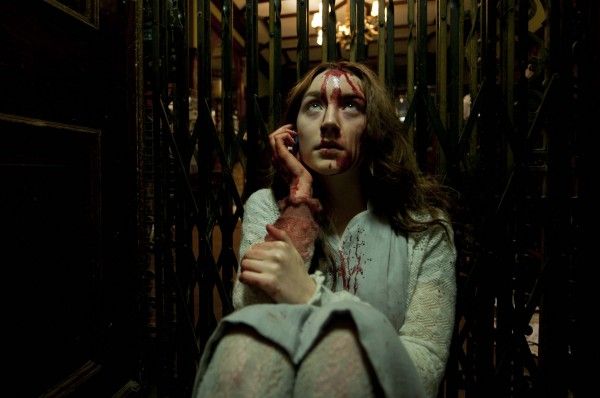The possibilities of the vampire story have become increasingly limited. The story has been around for so long, and has been done so many ways, especially of late, that it's difficult for a storyteller to come in and find a new spin within the predefined parameters of what we all agree is a "vampire": a bloodsucking immortal. In his new film Byzantium, director Neil Jordan has seized upon the "immortal" part and how a vampire would always be, in a sense, frozen in the past and unable to move forward. Consequently, Byzantium has trouble gaining any momentum. As its protagonist moans about telling a story hundreds of times but never finding anyone to listen, the film struggles to find a rhythm and gets bogged down in some cringeworthy dialogue. But the most frustrating aspect of Byzantium is how it fails to pursue a thoughtful, gender-related idea that holds far more potential than another exploration of how vampires are accursed creatures sentenced to wander the earth alone forever and ever anon.Eleanor Webb (Saoirse Ronan) is miserable being a vampire. She has been sixteen for over 200 years, stuck with her overprotective vampire mother Clara (Gemma Arterton), and isolated from the world because she's forbidden to share her story with anyone. She writes it down again and again, but then throws her story away to the winds. Eleanor stays alive by feeding on dying people who have made their peace with death, and Clara is a prostitute who takes out pimps and johns. After Clara kills a mysterious attacker, she and Eleanor are forced to flee to a new town. There, they take up with the sweet and unassuming Noel (Daniel Mays), and live in his mother's old guesthouse, Byzantium. Clara, taking the initiative, decides to turn the home into a brothel with Noel's permission. Meanwhile, Eleanor beings to fall for Frank (Caleb Landry Jones), which brings her perilously close to breaking her silence on her vampirism. Throughout the film, Eleanor and Clara relate how they lived before they were vampires, and how and why they sacrificed their souls in order to live forever. The first half of the film feels a bit too much like Interview with the Vampire, but without the campy fun. There's the young girl who has seen too much, and is depressed that she'll never grow up. Eleanor's sadness sinks Byzantium like a stone as we see a melancholy immortal who can only live in the past because she's been deprived of a future by her mother. Jordan lays the emotion on thick with Ronan's downcast eyes and depressed emotions accompanied by a duo of sad strings and piano.In the film's second-half, Byzantium eventually reaches a good rhythm in terms of switching between the past and present, and organically weaving in the narration with the pertinent part of the flashback.  We get to hear more of Clara's side of the story, and the script provides a revelation that's far more fascinating than why people who can't tell their stories become depressed. We learn that there is a brotherhood of vampires, and women aren't allowed to turn other people, which is a law Clara broke when she turned Eleanor.
The first half of the film feels a bit too much like Interview with the Vampire, but without the campy fun. There's the young girl who has seen too much, and is depressed that she'll never grow up. Eleanor's sadness sinks Byzantium like a stone as we see a melancholy immortal who can only live in the past because she's been deprived of a future by her mother. Jordan lays the emotion on thick with Ronan's downcast eyes and depressed emotions accompanied by a duo of sad strings and piano.In the film's second-half, Byzantium eventually reaches a good rhythm in terms of switching between the past and present, and organically weaving in the narration with the pertinent part of the flashback.  We get to hear more of Clara's side of the story, and the script provides a revelation that's far more fascinating than why people who can't tell their stories become depressed. We learn that there is a brotherhood of vampires, and women aren't allowed to turn other people, which is a law Clara broke when she turned Eleanor. Vampirism is almost always displayed in sexual terms (the bite itself is sexual, and it's important to note that the "turn" in Byzantium is done by having the vampire-to-be walk alone into a cave on a remote island), and Jordan has a unique perspective by displaying it through the lens of a mother/daughter relationship. The brotherhood would deprive women of motherhood, which is an ironic twist since Clara, through her confinement of Eleanor, deprives her daughter of womanhood. Eleanor will always be a child, not only in terms of her appearance, but in terms of being shackled to her mother.Strangely, Jordan seems far more fascinated with the relationship of how stories require listeners, and how the artist can't grow until they've connected with an audience. Not only is this done through the fairly-tired vampire trope of "Immortailty's Curse", but it also forces us to hear Eleanor's laughably bad narrated dialogue. A character who reads Eleanor's story says it sounds like the weird offspring of "Mary Shelley and Edgar Allan Poe". I'm pretty sure both authors would roll in their graves if they were credited with dialogue like "Everything outside of time is cold."Vampires stories have been told time and time again (and, to be fair, with worse dialogue), and by Jordan's definition of meaningless-repetition, the stories are just as miserable as Eleanor Webb. Ironically, Byzantium finds a way to move the genre forward into uncharted territory, but chooses to stay stuck in the same sad place by repeating a story that's been told before.Rating: CFor all of our TIFF 2012 coverage, click here. Here are links to all of my TIFF 2012 reviews:
Vampirism is almost always displayed in sexual terms (the bite itself is sexual, and it's important to note that the "turn" in Byzantium is done by having the vampire-to-be walk alone into a cave on a remote island), and Jordan has a unique perspective by displaying it through the lens of a mother/daughter relationship. The brotherhood would deprive women of motherhood, which is an ironic twist since Clara, through her confinement of Eleanor, deprives her daughter of womanhood. Eleanor will always be a child, not only in terms of her appearance, but in terms of being shackled to her mother.Strangely, Jordan seems far more fascinated with the relationship of how stories require listeners, and how the artist can't grow until they've connected with an audience. Not only is this done through the fairly-tired vampire trope of "Immortailty's Curse", but it also forces us to hear Eleanor's laughably bad narrated dialogue. A character who reads Eleanor's story says it sounds like the weird offspring of "Mary Shelley and Edgar Allan Poe". I'm pretty sure both authors would roll in their graves if they were credited with dialogue like "Everything outside of time is cold."Vampires stories have been told time and time again (and, to be fair, with worse dialogue), and by Jordan's definition of meaningless-repetition, the stories are just as miserable as Eleanor Webb. Ironically, Byzantium finds a way to move the genre forward into uncharted territory, but chooses to stay stuck in the same sad place by repeating a story that's been told before.Rating: CFor all of our TIFF 2012 coverage, click here. Here are links to all of my TIFF 2012 reviews:

